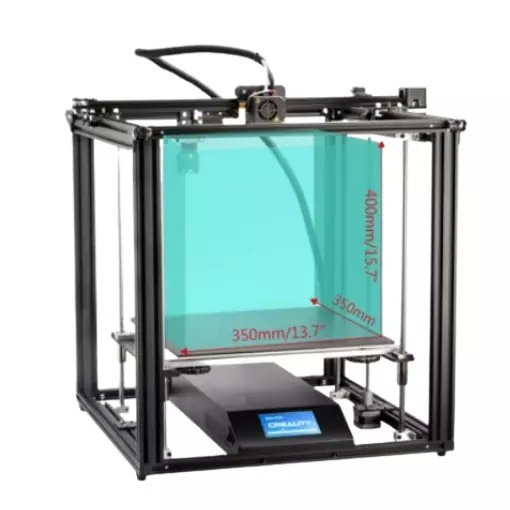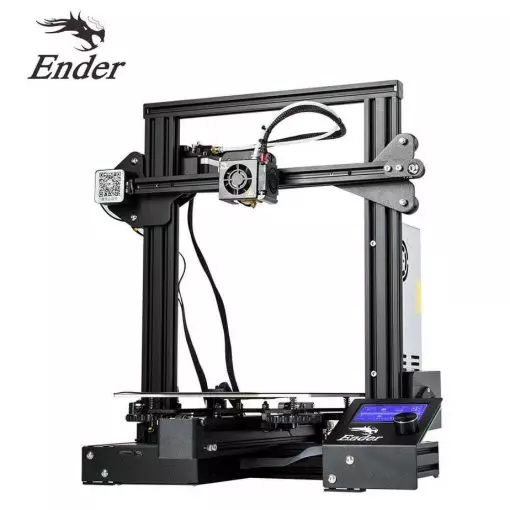Compare Ender 5 Plus vs Ender 3
Comparison between the best 3D printers
Choose the best 3D printer at the best price. The cheapest 3D printers are here.
Buy a 3D printer here with 3D Fila.
 |
 |
|
| Model | Ender 5 Plus[BUY Ender 5 Plus] |
Ender 3[BUY Ender 3] |
| Printing Material | Filament | Filament |
| Buy Filament for Creality 3D Ender 5 Plus | Buy Filament forCreality 3D Ender 3 | |
| Estimated price | $599,00 | $210,00 |
| Manufacturer | Creality 3D | Creality 3D |
| Release Year | 2019 | 2018 |
| Print Volume [mm] | 350x350x400 | 220x220x250 |
| Printer Size [mm] | 632x619x666 | 440x440x465 |
| Weight [kg] | 18,2 | 6,62 |
| Power Loss Recovery | YES | NO |
| Enclosed printer | NO | NO |
| Bed Leveling | Automatic | Manual |
| Filament End Sensor | YES | NO |
| Bed type | Heated | Heated |
| Power supply system | Bowden | Bowden |
| Standard nozzle | 0,4 | 0,4 |
| Maximum Nozzle Temperature [°C] | 260 | 255 |
| Maximum Bed Temperature [°C] | 100 | 110 |
| Maximum printing speed [mm/s] | 180 | 180 |
| Filament holder | YES | YES |
| Camera for supervision | NO | NO |
| Recommended filaments | PLA, TPU, ABS, PETG | PLA, TPU, ABS, PETG |
| Recommended slicers | Cura, Simplify, Slic3r | Cura, Simplify, Slic3r |
| Maximum Resolution [mm] | 0,1 | 0,1 |
| Processor | 32 bits | 8 bits |
| Display | Touchscreen TFT 4,3'' | Mono |
| Power Supply | 24V / 504W | 24V / 270W |
| Connectivity | SD / USB | SD / USB |
| Operating systems | Windows, Mac, Linux | Windows, Mac, Linux |
| Date of registration in the system | 2021-04-14 | 2021-04-13 |
| Release date | 2019 | 2018 |
| Extra features | The Ender 5 Plus offers a large print volume (350x350x400 mm) and fast assembly. It includes a BLTouch sensor, but with range limitations. It stands out for its dimensional accuracy, although it requires adjustments to the slicer settings. Despite the noise, its integrated design saves space, and includes features such as a filament sensor and power resumption. Ideal for large projects, it requires refinement in the settings for high-quality prints. | The Ender 3 V1 is a DIY assembly 3D printer, a sales leader since 2017, standing out for its cost-benefit. With a wide printing capacity, it has a CNC machined structure for precision and stability. It offers high-precision prints with low noise, thanks to its innovative V-profile and pulleys. It has a self-adhesive magnetic platform for easy removal of models and excellent adhesion. The Ender 3 heats up quickly, reaching 100°C in 5 minutes, ideal for agile prints. It includes protection against power failures, allowing you to resume printing after interruptions, saving time and material. |
| Support for multiple colors and materials (AMS and CFS) | NO | NO |
Notes * |
||
| Cost-benefit | 6 / 10 | 6 / 10 |
| Hardware | 2 / 10 | 0.5 / 10 |
| Tela | . | . |
| Print volume | 4 / 10 | 3 / 10 |
| Performance | 1 / 10 | 1 / 10 |
| [BUY Ender 5 Plus] | [BUY Ender 3] |
Conclusion |
| In conclusion, the choice between the Ender 5 Plus and the Ender 3 ultimately depends on your specific needs and budget. The Ender 5 Plus offers a significantly larger print volume and advanced features such as automatic bed leveling, a filament sensor, and power loss recovery, making it ideal for larger projects and more complex prints. Its enhanced processor and touchscreen display also provide a more user-friendly experience, although it does come at a higher price. On the other hand, the Ender 3 is an excellent budget-friendly option that maintains a strong reputation for its reliability and print quality. Its lower price point makes it accessible for hobbyists and beginners, while still delivering solid performance with a decent print volume. Although it lacks some advanced features, its DIY assembly encourages a hands-on experience that many users find rewarding. Ultimately, if cost-effectiveness and simplicity are your priority, the Ender 3 stands out as the better option. Conversely, for those seeking to undertake larger projects or requiring advanced functionality, the Ender 5 Plus is worth the investment. Both printers are capable of delivering great results, making your choice contingent on the balance between budget, intended use, and feature preference. |

